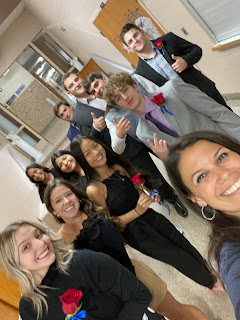Time Well Spent
I pulled their grades and we talked about their academics. I asked how things were going socially and if they were able to yet participate in our extra-curriculars or if they planned on it. We talked about dress code and I asked what it was like to attend a religious school that included prayer and mass with their classmates. (While I thought the answer was going to be "awkward" or "weird" it was overwhelmingly "nice" and "I really like it"). I asked what they liked the best, what was a challenge, and how their experience compared to their last school.
As a disclaimer, I support public education. I support all education. If we don't invest in our schools, public or private, our society has a bleak future. I think what is happening with high-stakes testing in public education is devastatingly wrong, but that is more like a novel than a blog entry. I left public education after 14 years because I felt I could make a bigger impact in the right direction at Kennedy, and it gave me the opportunity to get back to being around teenagers (Glutton for punishment?). Anyways, I digress.
What we are doing with our programming is more important than what happens at the end of the day, the end of the school year, the end of the high school career. We aim to build and mold the leaders and doers of tomorrow. Do I want a student to complete their work or to pass a test? Of course. But not for the sake of the grade in the book. I want them to complete their work because it builds discipline. I want them to pass a test because it shows they dedicated time to learning something new, regardless if they think it is interesting or important. (I hope it is both interesting and important). The content is probably important. The skill of learning is important. The desire to want to learn, more important still. I'll give a few examples I have seen just this year.
A student in Entrepreneurship class sat in front of a computer, typing an assignment. His headphones were on (not unusual). His iPad was tucked between his body and the keyboard. He kept looking down at the iPad between typing sentences. I casually walked over and peeked over his shoulder to see what he was watching, fully expecting some unrelated YouTube video, sports highlights, or music playing. It was a YouTube video, on cold-calling to help your company get business. He was typing a script he wanted to use to cold-call area businesses to see if he could earn more business for the Think Lab. This was all completely undirected.
A Theology project included a reading with students writing questions they had with the vocabulary. Then they had to answer the questions through their own research. In the Netflix generation of instant information and the ability to "get it now," this was frustrating for many. However, accessing information is a key skill needed in today's workforce. Information is cheap, but you need to know where to find it.
Building character is a major component of the education we aim to provide at JFK. Sometimes it takes up time during the school day. A student recently found money on the floor and turned it into a teacher. It was eventually recovered by the correct student in class. Tears were streaming down her face. It is her first year at Kennedy, and she had been so anxious about losing this considerable sum. She couldn't believe someone would turn it in and not keep it. The class spent the next 20 minutes talking why something like this was so nice. It was great for the students who are new to share their experiences and eye-opening for our Kennedy-since-Kindergarten students.
We recently attended the "Twenty Under 20" awards, where two Kennedy students were honored as nominees. Not only did both make it into the Top 20 for nominees....they both made it to the top 5, and Gannon Fridley was the winner of the award. Both he and Dante Zamarelli thanked their school for giving them opportunities for service and leadership. It was a wonderful night celebrating many youth from Trumbull County!
Students being able to explore their passions takes time; a lesson involving students finding the information on their own takes more time than the teacher presenting the information; talking about character and morality and mortality takes time; Mass and adoration and prayer take time. We can compare our ACT scores, our innovative curriculum choices, our championship athletics, and our extra-curricular offerings as a side-by-side list or data points on a chart. What you cannot compare is the time we take to do the things that are not tangible. The time spent learning how to learn. The time spent developing our faith. The time spent having conversations that aren't related to the learning. All of these things are what sets our school apart, and what makes a Catholic education "worth it." Because in my eyes, this is all time well spent.




Comments
Post a Comment